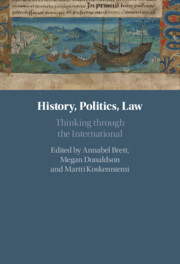Book contents
- History, Politics, Law
- History, Politics, Law
- Copyright page
- Contents
- Acknowledgments
- Notes on Contributors
- Introduction History, Politics, Law
- Part I Methods, Approaches and Encounters
- Part II Thinking through the International
- Law and Constructions of the Political
- Empires, States and Nations
- 7 Law of Nations, World of Empires: The Politics of Law’s Conceptual Frames
- 8 The History of Political Thought in the African Political Present
- Institutions and Persons
- Economics and Innovation
- Gender
- Index
7 - Law of Nations, World of Empires: The Politics of Law’s Conceptual Frames
from Empires, States and Nations
Published online by Cambridge University Press: 28 September 2021
- History, Politics, Law
- History, Politics, Law
- Copyright page
- Contents
- Acknowledgments
- Notes on Contributors
- Introduction History, Politics, Law
- Part I Methods, Approaches and Encounters
- Part II Thinking through the International
- Law and Constructions of the Political
- Empires, States and Nations
- 7 Law of Nations, World of Empires: The Politics of Law’s Conceptual Frames
- 8 The History of Political Thought in the African Political Present
- Institutions and Persons
- Economics and Innovation
- Gender
- Index
Summary
From the perspective of political theory, the history of international law may be seen as a significant and underexplored aspect of a broader phenomenon: the involvement of moral universalism, and especially liberalism, in forms of domination in spite of and indeed partly because of universalist moral commitments, commitments that remain compelling and perhaps unavoidable even given their complicity with domination. Law seems a version of this dilemma that demands particular attention for a number of reasons: among others, because the structure of legal argument demands treating like cases alike, and because legal arguments made in the past have not just a conceptual hold on the present but also more concretely institutionalized forms of influence than is often the case for the normative arguments treated in the history of political thought.1 The history of legal argument warrants more attention, I think, than it has received from political theorists, but I share the doubt recently expressed by Martti Koskenniemi about whether international lawyers and historians of political thought who study the history of international law are really working as differently as some have claimed.2 Koskenniemi has spoken critically of interdisciplinary conversations that entrench static self-conceptions on the part of the participating disciplines, and he speaks enthusiastically of the attitude ‘let’s see what’s going on there, and whether we can use what they use for our purposes’.3 Although it is tempting, then, to consider what international law can bring to history and political theory, and vice versa, perhaps the more important task, which has in fact been taken up across these disciplinary divides, is to think outside the liberal episteme. This has meant a repudiation of the once standard mode of writing the history of international law, which, in keeping with liberal self-understandings, tended to be teleological and triumphalist, and to overlook the role of power in the ascendancy of certain legal norms or institutions. The belief or desire that law could furnish some perspective outside or above politics, that it provides a merely technical, and essentially apolitical, vocabulary and set of institutions for adjudicating conflict or mitigating suffering, remains powerful among some who write histories of international law, and histories are still being written that are insufficiently attentive to international law’s politics and imperial entanglements. Liberal political theory has been prey to a similar aspiration to serve as a neutral arbiter between competing systems of value or conceptions of the good, and has been likewise slow to reckon with the imperial nature of modern liberal states and the often intense involvement by liberal thinkers in the practice and justification of imperial domination.4
- Type
- Chapter
- Information
- History, Politics, LawThinking through the International, pp. 191 - 207Publisher: Cambridge University PressPrint publication year: 2021



